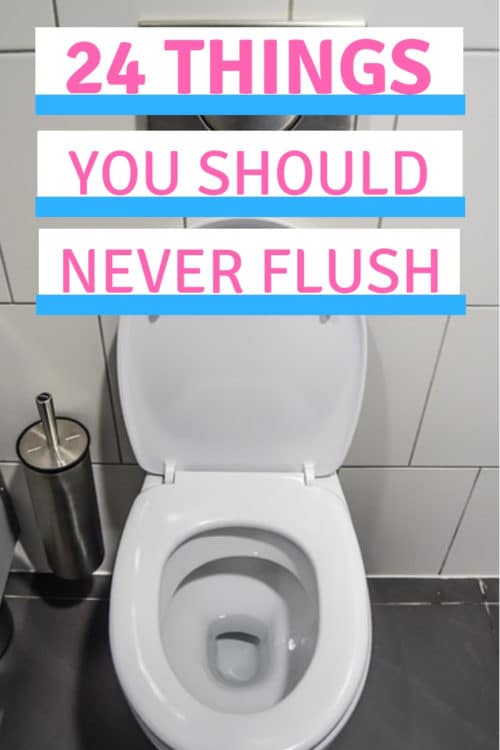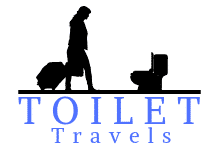Most people don’t make a habit of flushing random things down the toilet. Yet year after year, generation after generation, it occurs.
As children, we peer into the depths of the toilet and wonder, “Where does it go? Will it consume anything?” We test objects of different sizes and shapes to see if it’s consumed by the porcelain God.
In most cases, the toilet swallows it without hesitation. In other cases, the toilet struggles to gulp it down. In the worst case, the toilet overflows in disgust.
Whether your toilet can handle wet wipes, pet hamsters, or kitty litter isn’t the real issue. Even if your toilet can handle a wet wipe it may cause problems downstream where it remains for years, unable to break down.
In this article we’ll discuss 24 things you should never flush down the toilet. The items are predominately bathroom items and many of them can cause long-term plumbing issues. We’ll also look at where our toilet waste goes and how the items we put in the toilet can affect the environment.
What Happens When We Flush The Toilet
When is the last time you thought about where your water goes? In most cases, we flush our toilets and forget about it. Sure, we know it goes into pipes that connect to sewers, but what happens after that?
Did you know that our wastewater, whether it be from the toilet or kitchen sink, goes to a treatment facility? There is it processed, filtered, and sanitized before it is released into our waterways. Yes, our wastewater goes back into our lakes, rivers, and oceans.
When you think about where our wastewater goes, you might think twice before flushing your medicine, or wet wipes down the toilet. These items, including many others like oil and paint, make it difficult for municipal treatment centers to clean.
I don’t know about you, but I don’t want paint, medicine, and oil in the same rivers that I fish and swim in.
You might be wondering, “what about toilet paper”. Toilet paper is manufactured in a specific way that makes it easy to break down. It actually dissolves in water, just like human waste. Once it arrives at the treatment facility, it can easily be processed because it’s biodegradable.
Think twice before you flush that item! 
24 Items Not To Flush Down The Toilet
-
Medicine
Have expired medicines in your bathroom cabinets? It’s okay, most people do. How you choose to dispose of them is important because there are synthetic chemical ingredients in them that make them hard to break down.
Sure, they dissolve in water but the ingredients are difficult to remove from water.
You might be surprised, but it’s common for municipalities to find birth control medicine in waterways. Yep, by flushing old birth control pills down the toilet you might be exposing others to those chemicals (men, women, and animals).
Americans consume an unusually high amount of prescription drugs. If you need to get rid of them, use the garbage, not the toilet.
-
Paper Towels
Paper towels may seem harmless, but they can do damage to your toilet and pipes. Over time they will break down, but because they’re thick it takes time.
Paper towels tend to block pipes in the toilet and under the house. Fixing the problem will take time, cost money, and require effort.
-
Wet Wipes
Wet wipes have become a major problem in the U.S. and are one of the main causes of clogged pipes. Some people prefer to use wet wipes to regular toilet paper because they’re moist and can disinfect.
Even if your wet wipes say “flushable” I’d stay away from them. Sooner or later your pipes will become clogged!
-
Gum
If you’re like me, you’ve flushed your gum down the toilet a few times. It seems harmless, right? Most cases it will be harmless, but gum doesn’t break down very well.
If you already have backed-up pipes, gum can add to the block. It’s just another thing that isn’t meant for the toilet or sewage system. Throw gum in the trash.
-
Feminine Products
Tampons and other pads are one of the most common items flushed down the toilet. I suppose most people want to get rid of it. But here’s the problem, it won’t break down and actually absorbs moisture.
When a tampon enters the pipes it will absorb moisture and can lead to blockages. In older homes with older, narrow pipes this may be a problem, however, it will rarely be a problem in newer homes.
-
Hair
Hair may seem like the perfect thing to flush down the toilet, but it’s not. Hair is thin and small, but it tends to get hung up inside sewage pipes.
Once hair is caught inside a pipe, it can catch other items as they pass by – this is how a clog occurs.
You’ve probably seen what hair can do to a shower drain. It can do the same thing inside of your pipes.
Hair will break down over time. Opt to put it in the trash or to add it to your compost heap outside.
-
Dental Floss
Many people put their used dental floss in the toilet every day. This isn’t good. Dental floss does the same thing as hair (mentioned above) but it’s usually made from plastic – so it will take years to break down.
You don’t want the possibility of having dental floss in your pipes for years!
-
Q-Tips
Q-Tips are made from cotton and cardboard (sometimes plastic too). Q-Tips won’t likely cause problems once it gets out of your pipes and into the sewage system, but it can back things up under your house.
>> learn how to use a pumice stone to clean the toilet
-
Cotton Balls
Cotton balls are fluffy, absorb water and can contribute to existing clogs in your pipes. Throw these away in the garbage can rather than the toilet.
-
Band-Aids
Band-Aids are sticky and synthetic. They won’t dissolve in the toilet you’ll need to cross your fingers and hope it isn’t held up in your pipes.
If you’re flushing Band-Aids, hair, dental floss, and wet wipes, chances are they will work together to make a massive blockage.
-
Food
Banana peels, old tomatoes, and pizza crust are all organic waste, however, they take time to disintegrate and it won’t happen while it’s still in your sewage pipes. It may seem harmless to flush food items but food is usually large and can cause blockages.
-
Kitty Litter
Kitty litter is a popular item to flush down the toilet. After all, isn’t pet waste the same as our waste? Your logic may help you believe so, but kitty litter is full of inorganic materials and has a tendency to get stuck in pipes.
Instead of flushing kitty litter, teach your cat to use the toilet (my article on the best kitty toilet trainers).
-
Plastic
Plastic makes up so many of our bathroom supplies. When we can’t find a garbage can we might think the toilet is the second best option. It’s not a waste disposal and plastic won’t break down for hundreds of years.
Think twice before flushing plastic items.
-
Cigarette Butts
Cigarette filters stick around for years. Even worse, the tobacco contains many inorganic chemicals that are bad for the environment.
Sure, much of the chemicals will be processed at treatment plants, but others will remain in the water and be released into our waterways.
-
Diapers
Aren’t diapers a little big for the toilet? Yes, and people still try to flush them. I’d be that most people would never flush a diaper in their toilet at home, but they may try at a public restroom because “it’s not theirs” (we all pay for the maintenance of our public restrooms through tax dollars).
Use a garbage bin and never flush a diaper down the toilet – it will lead to a clogged toilet and can damage pipes.
-
Small Metal Items – Paper Clips, Tacs, Staples
Find some paper clips in your pocket while sitting on the toilet? It might seem like a good idea while you’re on the pot, but putting metal objects, however small, down the toilet is a bad idea.
These items won’t degrade and they will sit on the bottom of sewage pipes for years (they are heavy so they settle on the bottom).
-
Condoms
Trying to hide a condom? Don’t want to put it in the trash can? Yeah, many people think a toilet is a great place for condoms. It will vanish like it was never there…until it clogs up your pipes, then it will be a little embarrassing.
Save yourself the hassle of using the plunger, or calling a plumber, and put the condom in the trash.
-
Baby Wipes
Baby wipes are similar to wet wipes and used to keep up a baby when changing their diaper. They should be placed inside the old diaper and thrown away. They will not dissolve in the toilet bowl, nor will they in your pipes.
-
Pets (hamsters, rats, snakes, fish)
Dead pets are commonly flushed down the toilet. I’m not sure why or how this became popular, but I have seen it in a few movies.
You can get away with fish down a toilet because they are usually small, but larger, furry rodents spell nothing but trouble. Imagine what the plumber will say when he finds a smelly, partially decomposed hamster (named Hammy) in your pipes. Oops!
-
Dead House Plants
That dead house plant you forgot to water does not go in the toilet. It goes outside in the compost pile or in the green trash can. Plants are organic, but they take time to break down.
-
Oil and Grease
Whether it’s motor oil, cooking oil, or bacon grease, it does not go down the toilet. Grease gets hard when it’s cooled (cool water) and it will coat the inside of pipes.
Once it coats the pipes it can attract other inorganic items that are flushed. These items can stick to the greasy surface.
-
Chemical Cleaners
Strong chemical cleaners are sometimes needed to clean the toilet, but I prefer to use natural toilet cleaners like vinegar, baking soda, and pumice stone.
-
Paint
Paint has toxic ingredients and can damage your toilet, not to mention the pipes. Paint is also extremely difficult for sewage treatment centers to process.
-
Beauty Products
Powder, lipstick, soaps, Vaseline, and other beauty products might be easy to throw into the toilet but their ingredients, like oils, can be bad for your pipes. Utilize a trashcan if possible.
Conclusion
I believe that most people use the toilet as a garbage can because their other option is full or missing. If you have a small trash can in the bathroom it will likely be used for the items mention on this list.
We flush our toilets and forget where it goes and how it’s processed. But if we thought about the energy that does into sewage treatment plants and the fact that the water is released back into our waterways, then we’d probably pay more attention to what we flush.
Our toilets are made for toilet paper and human waste. These two things break up easily in our pipes and are easy to treat.
Flushing items that are designed for the toilet will help keep our toilets in good condition and save us money in the long run. Thanks for reading and be sure to check out our other bathroom and toilet articles.
